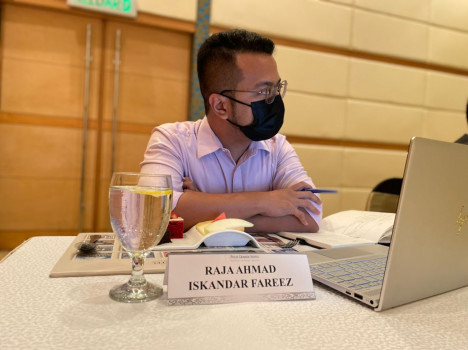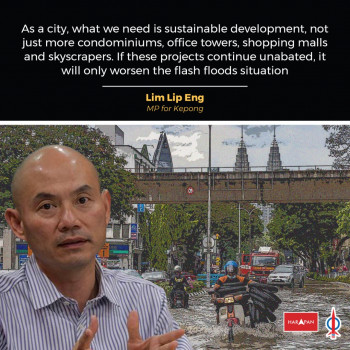by Maryam Ramli Lee and Nur Syazana Syamsudin
Diversity comes from the word diverse, which means the quality of being different. Some nations have little differences in their social demography. Malaysia – our unique Malaysia, has a lot. In the eyes of the mainstream media, Malaysia consists of only the Malays, the Chinese and the Indians. Mostly, their sensational stories revolve around the Malays and the Chinese. Other races tend to get sidelined. We focus so much on our differences, we forgot to look at what makes us Malaysian. What makes us Malaysians is our differences. If only we can accept our differences as a part of us, no politician in the world can divide us so easily.
I see Malaysia as a really big house. This house has a lot of rooms. There are rooms for the parents, the brothers, the sisters, the living rooms, the bathrooms, the reading rooms, the discussion rooms, the sports hall, the lake for swimming and fishing and the big backyard garden for everybody to cook up delicious foods and have a ball together every once in a while. Despite all the labels we give to each part of the house, all of them are still a part of the same house. It is still one house where everybody lives together under one roof. There are physical division walls separating each and every room, but in the eyes of the occupants of the house, there are no psychological divisions, for no one is not allowed to enter any other rooms. There are only multiple rooms – multi-room, a diversity of rooms, united under one roof.
The Reason to Let Vernacular Schools Stay
At least that’s how I see Malaysia. Our language, our culture, our heritage and history have shaped our social structure, hence the structure of our education system. We used to have English medium schools, along with vernacular schools. Now the English medium schools are national schools in which the medium of language is Malay, along with vernacular schools in which the medium of language is the target languages, be it Mandarin or Tamil.
Acquiring the target language is the key point here, the utmost main purpose of going into a vernacular school. It takes many years for a person to be able to speak, write and read Chinese like a native. It helps a lot to start from young, because young children catch any languages much faster than adults. At this point, people may say, “So what? That’s the same for all languages. I didn’t need to go to an English school to learn English.” That’s where they don’t understand, because they don’t have the schemata of the struggle it takes to learn this five thousand year old language (when referring to the Chinese civilization, it is always five thousand year old). The Chinese language doesn’t have alphabets, they consists of different Chinese characters. A lot of them sound exactly the same, but the symbols tell them apart in meanings. There are over fifty thousand units of these Chinese characters, you need to know four to five thousand of them to achieve literacy. It is impossible to learn by a simplistic, unrealistic solution of bringing in Mandarin teachers to teach Mandarin in national schools.
A lot more goes on during the eleven years of Chinese vernacular school for the sole purpose of acquiring the language. So many things can go wrong, words and phrases can often be spoken out of context, just because one word has the same sound but a different meaning. We need our vernacular schools as a nest, to painfully (if I may add) nurture and internalize the target language. I am not undermining the English language or the Malay language, all languages are beautiful in their ways, but trust me when I say that writing and reading in Chinese is a thousand times harder. Many Chinese language learners do not get the language by just going to school and read the textbooks. Independent learning plays a very crucial part to get even the basics, such as reading up on the history of Chinese words and spoken language. Where do you think all the adages come from? The phonology, morphology, semantics and syntax are a result of a five thousand year old civilization. To get to advanced Chinese language acquisition, you actually need a specialized language course. 11 years of Chinese-medium school is not enough.
I went to a Chinese vernacular school from primary one till primary six, the reason was because my father wanted me to be able to speak Mandarin with my grandparents. In other words, the reason was for me to acquire the language. Anyone can have the desire to learn Mandarin, not just those of Chinese descent. Whoever you are, regardless of race, if you want to acquire the Mandarin language of an average person, your best chance is a Chinese-vernacular school. I asked around friends who are not of Chinese descent but went to Chinese-vernacular-schools, and the answers I got were the same. The language helped them opened up to other opportunities others are not opened to. But that doesn’t mean that people without the language can’t get ahead in life. People simply go into different directions, not necessarily better or worse, based on the abilities that they have.
The Real Issue
I am sorry I cannot give real-life examples of the situation in Tamil-medium schools, but I know for a fact that vernacular schools are actually one of our strengths. If you want to argue that the reason why Malaysians are disunited is because of the different languages we speak – due to vernacular schools, that is only a symptom, not the real problem. Malaysian education system is centralized, every school gets the same syllabus, though some may not necessarily use the same textbooks because the level of difficulty for different types of schools varies. I will talk more on the syllabus later on, but suffice here to say that the syllabus is also not the problem, the real problem is the implementation of the syllabus. Instead of trying to improve the flaws in the system indicated by the symptoms, we want to kill the system altogether. When another psychological disease attacks the new system, do we kill it too? If yes, when does it end? The problem is not language, the real problem is character building.
Being able to speak Mandarin does not hinder a person from forming close friendships with non-Mandarin-speaking friends. The same goes the other way around. All schools are required to teachBahasa Melayu to their students, majority of Malaysians do know how to speak Bahasa Melayu. If we don’t have Bahasa Melayu, fear not, we have English too. The fact of the matter is, Mandarin for example, is just another extra language for most Mandarin speakers. It is not our only language. When the time is appropriate, or needed, we have one extra language to fall back on. Perhaps a crisis appears written or spoken in Chinese, being able to solve that crisis is a strength, no? Standing strong together, despite knowing our differences is a strength, no?
As for character building, what we need is to foster in our students that language is not a barrier. We need to create a no-fear zone for our young to interact kindly with everyone regardless of race. No matter what schools we go to, if we are trained to get along with other people no matter what language you or the other person mainly speaks, it doesn’t matter. What school we come from or what language we have or don’t have become non-issues when we understand that 1) it is everybody’s right to acquire another language, at the same time 2) it is every Malaysian’s duty to learn Bahasa Melayu or English for the purpose of communication. Isn’t it so much fun to be multi-lingual? In fact, most urban Malaysians are multi-lingual. If you think you’ve found no other common grounds, that could be it.
Another reason why vernacular schools are not the real reasons for disunity among Malaysians, is because our politicians are not setting good examples for the people. This issue is a created issue to continually lead us to believe that anything can divide us so easily. It is a psychological warfare designed to make us think that unity cannot exist in diversity. Racism is deeply entranced in our politics, staining our relations with one another, blaming it on everything else including education systems (and the Jews). It is so easy to point out the flaws of others, but not so easy to point out our own flaws, isn’t it? Those who call for the abolishment of vernacular schools could bear to see the destruction of another ethnic’s language and culture as long as it is not their own. I wonder if we ask them to abolish their own language and culture would they so willingly concur.
Different schools don’t divide us, divisive principles do. Malaysians who attend vernacular schools are not so shallow as to disassociate themselves from Malaysia. If language alone had ever been enough to separate us, that would have happened a long time ago. Language is a means, it is not an end in itself. Through different languages, we can still propagate the same values. To truly achieve a uniformed identification of a Malaysian Malaysia, what we need are values that keep us to together, not necessarily through the same type of schools. National schools, vernacular schools, MRSMs, SBPs, Sekolah Agama Rakyat (SAR)s, private schools and international schools – must pay attention to instill the values of loyalty to the country, to affirm the importance of unity, to honour the consensus in a democracy, and to love the idea of unity in diversity.
Diversity comes from the word diverse, which means the quality of being different, not the quality of being divided. -The Rocket
* The views expressed here are the personal opinion of the columnist.



